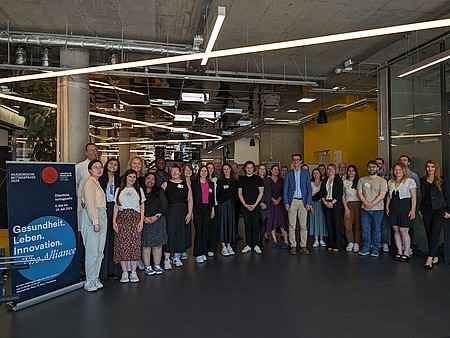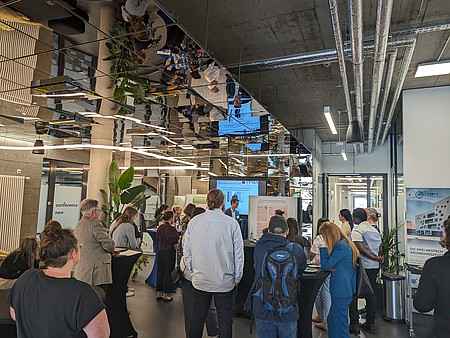Sie befinden sich hier
Inhalt
On May 13-14, 2024, the final symposium of the DFG-funded Research Training Group (RTG) 2350 “Impact of Adverse Childhood Experiences on Psychosocial and Somatic Conditions across the Lifespan” took place at the Cubex One in Mannheim.
The Event: The two-day final symposium provided an update on the current state of knowledge on the effects of adverse childhood experiences. The symposium was opened by Andreas Meyer-Lindenberg, director of the Central Institute of Mental Health (CIMH) followed by a welcome by RTG 2350 spokesperson Christian Schmahl, head of the clinic Psychosomatic Medicine and Psychotherapy at the CIMH and Professor of Psychosomatics and Psychotherapeutic Medicine at the Mannheim Medical Faculty of the University of Heidelberg. The final symposium offered an excellent opportunity for the 24 PhD and MD students of the second cohort to present their work and achievements resulting from their three research years (2021 - 2024) with the RTG 2350. Invited doctoral students from the collaborative group of Prof. Lourdes Fasanás at the University of Barcelona, Spain, also presented their research projects. A total of 11 doctoral projects were presented as oral presentations and 13 discussed in the poster session. An overview of the results of the complete 6 years of RTG 2350 was given by Christian Schmahl. The program provided numerous networking opportunities and stimulated exchange with colleagues, collaborators and external guest.
Keynote lectures: The symposium featured three leading international experts in the field of trauma who presented their latest findings:
- Professor Christine Heim (Charité – Universitätsmedizin Berlin, Germany), who studies the mechanisms by which stress and strain early in life lead to fundamental changes in adaptability across the lifespan, spoke about “Neurobiological Consequences of Early-Life Stress: From Mechanisms to Novel Approaches for the Developmental Programming of Lifelong Health”
- Professor Martin Teicher (Harvard Medical School, USA) is a renowned expert in the field of developmental biopsychiatry and aims to improve the lives of children, adolescents, and adults by exploring the causes of psychiatric disorders that arise during development. He spoke about “Childhood Maltreatment: Windows of Vulnerability and a Novel Understanding of Resilience and Recovery”
- Professor Grete Anita Dyb (University of Oslo, Norway), who focuses on research on psychological trauma and who has recently led a research project on the effects of the 2011 attacks in Norway spoke about “Adolescents in the midst of terror: Can health services mediate the impact?”
“Overall, the RTG was a complete success. The excellent presentations by the doctoral researchers and the interaction with the keynote speakers at the final symposium were impressive,” concluded Christian Schmahl.
The RTG 2350 was funded by the German Research Foundation (DFG) from April 2018 until March 2024 and investigated psychosocial, neurobiological, and somatic sequelae of adverse childhood experiences (ACE). The central aims of the 15 projects forming the RTG 2350 were:
(1) Investigation of the role of type, timing and intensity of adverse childhood experiences and protective factors in the emergence of ACE-related disorders;
(2) Elucidation of the psychosocial, neurobiological and epigenetic mechanisms underlying ACE-related psychiatric and somatic disorders;
(3) Development of novel psychosocial and pharmacological treatment possibilities as well as public health programs for ACE-related conditions.
In the first cohort, 19 PhD and MD students worked on their projects from 2018 to 2021 and presented their results at the final symposium and spring school of Research Training Group 2350 in June 2021. The second cohort, which started in 2021, consists of 24 PhD and MD students who are close to completing their projects. The RTG 2350 "Impact of Adverse Childhood Experiences on Psychosocial and Somatic Conditions Across the Lifespan" enabled doctoral students to prepare their own research project leading to their dissertation. To date, the PhD and MD students from the first and second cohorts of RTG 2350 have together published their findings as more than 70 peer-reviewed articles.
Through careful mentoring in the process of conducting research on sensitive trauma-related topics, RTG 2350 has encouraged and fostered a professional attitude among doctoral students characterized by commitment to the projects and the development of their own scientific ideas.
The organizing team would like to thank the keynote speakers, principal investigators and all the PhD and MD students of the RTG 2350 for participating in this highly relevant and productive meeting.
Sylvia Steinmann & Christian Schmahl
The final symposium of the RTG 2350 was supported by the Health + Life Science Alliance Heidelberg Mannheim.



